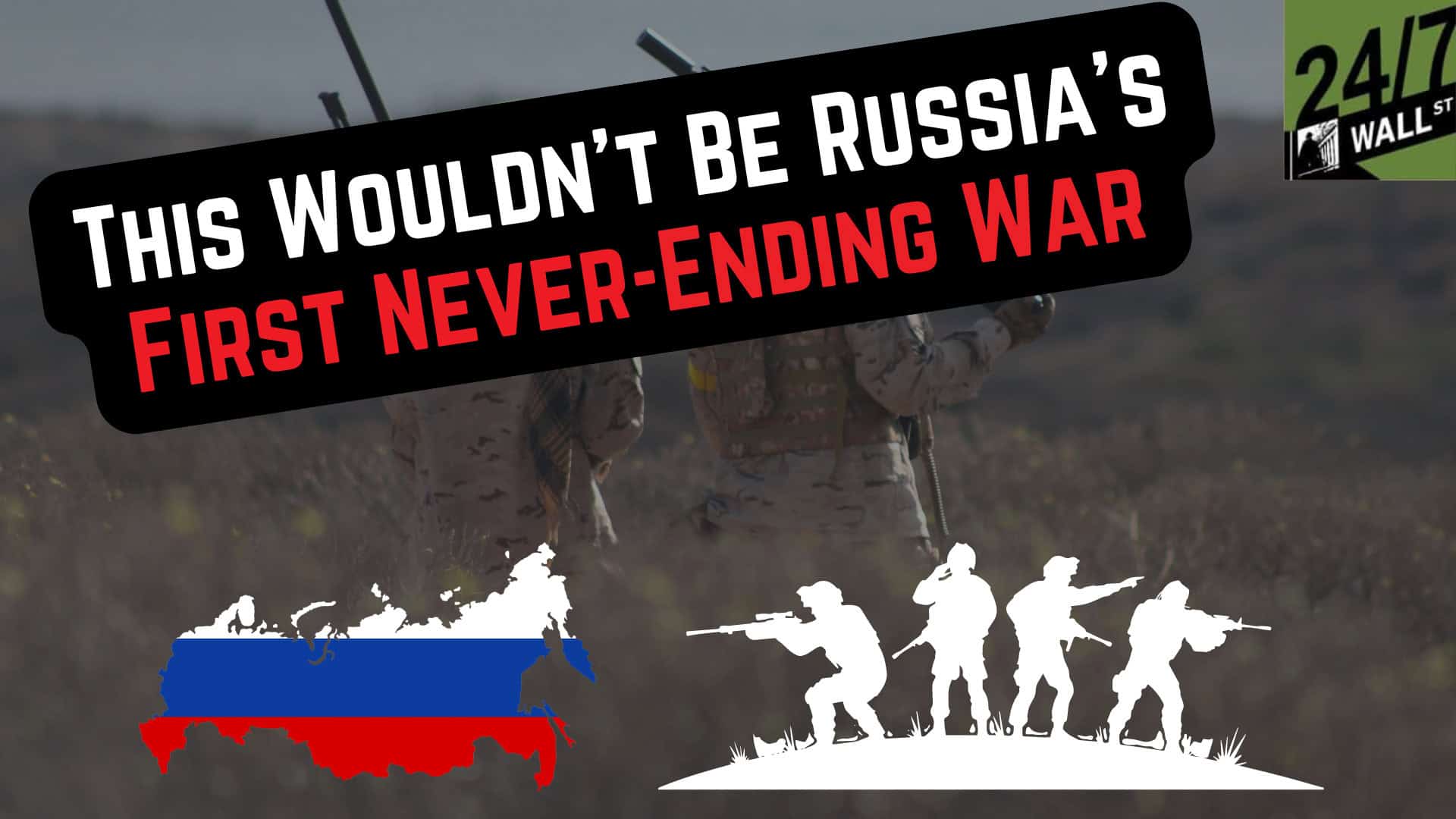
Key Points:
- “Never-ending wars” include Vietnam, Soviet-Afghan War, and the Global War on Terror.
- External support, like Western backing of Ukraine, can prolong conflicts.
- Isolating external support is crucial but challenging in counterinsurgency efforts.
- Also: Smart money is placing bets for 2025’s best investment, and “the next Nvidia” is a frontrunner. Click here to learn more now.
Austin and Michael discuss the concept of “never-ending wars” and how the Russia-Ukraine conflict could potentially mirror historical examples. They mention the Vietnam War and the Soviet-Afghan War as examples where military victory was impossible, leading to prolonged conflicts. Michael explains that these wars often lack clear objectives and are sustained by external support, which can prolong the conflict indefinitely. They also touch on the importance of isolating a nation to successfully end such wars, citing the British intervention in Malaya as a rare example of success in counterinsurgency warfare.
Watch the Video
Edited Video Transcript:
[00:00:00] Austin Smith: Are there other examples from history where the world has seen versions of endless war? You said no war is literally endless. We know that but what are some other examples from history that we can mirror? If this is the direction Russia, Ukraine is going, that we can look at to see what does it look like?
[00:00:15] Austin Smith: What does it look like for those countries, for those populations from a tactics standpoint?
[00:00:19] Michael Muir: Yeah. The idea of Never ending war really has become, it’s been used a lot more in the aftermath of 9 11. It’s often applied to the global war on terror, which is an abstract objective.
[00:00:30] Michael Muir: But actually, if you look at the Cold War. There are a couple of conflicts that immediately come to mind that I imagine our viewers probably have already anticipated. The first one, America’s involvement in Vietnam. It’s a textbook example of a forever war. There wasn’t really a front line, so to speak.
[00:00:45] Michael Muir: There wasn’t a specific objective. It was more or less proper. It was stopping the spread of communism, Southeast Asia propping up South Vietnam. And if you look at the, the military statistics from that war, there was really no doubt whatsoever that the casualty figures were very lopsided.
[00:01:00] Michael Muir: The Tet Offensive is often held up as a watershed moment in that conflict. But if you actually look at what was achieved, it was very strategically, it was very little, but the perception it created was that the war was essentially unwinnable. The U. S. was never in any danger of complete defeat, but simply had no way to force its will on North Vietnam, so long as they were willing to stick it out.
[00:01:20] Michael Muir: That conflict, if we include, the earlier conflict with the French, it lasted 20 years. They were in it for the long haul, and the United States just didn’t have the means to achieve militarily, but was never As I say, in any danger of losing similarly the Russian intervention on Afghanistan from 1979 to 1989.
[00:01:37] Michael Muir: It’s another good example of that. Russia’s involvement was limited. It was only ever the 40th army that was deployed to Afghanistan. Now, they took a very deliberate, brutal approach to pacifying the region, but they were never able to. Again, it wasn’t a case of capture the enemy’s capital or destroy the enemy’s army, because they would be attacked by irregular forces, they would then melt away again.
[00:02:01] Michael Muir: No matter how brutal the reprisals, they kept coming back. Gorbachev called it a bleeding wound and just wanted to pull out in the end. And then, we saw the U. S. led coalition, which is a far in the same country, a few years later, which was a far, which was a very low intensity conflict.
[00:02:16] Michael Muir: But again, there was no way of achieving victory there through military means propping up the government in Kabul proved to be very ineffective. And after 20 years, whatever progress had been made was done almost, immediately.
[00:02:32] Michael Muir: Again, we’ve talked about the war on terror the ongoing Russian intervention in Syria has been going on for, I believe, 11 or 12 years now with very little to show for it. So those are the characteristics or examples of so called never ending or forever wars.
[00:02:46] Austin Smith: Is there another element here?
[00:02:48] Austin Smith: I don’t know this will hold true for all of the examples that you talked about, but. Is there an example of proxy war other countries support behind the scenes that seems to be extending these never ending wars in some cases right there? Is there like an Iran backing militias in one country that allows that conflict to continue?
[00:03:07] Austin Smith: Or in the case of the Ukraine, Russia, Western nations backing Ukraine, is there a proxy or a? A support element that allows these to continue longer than they otherwise would.
[00:03:18] Michael Muir: Yeah. That’s actually one of the keys to counterinsurgency warfare is isolating the nation that’s involved. So one of the very, very few examples of success was the British intervention in Malay in the 1950s.
[00:03:32] Michael Muir: That was a very long term project. And what they were able to do was isolate Isolate the supply of outside forces. Again, it took a very long time. Took a lot of political will. But yeah, outside support can prop up resistance for years indefinitely. So that, that, yeah that’s an important point.
It’s Your Money, Your Future—Own It (sponsor)
Retirement can be daunting, but it doesn’t need to be.
Imagine having an expert in your corner to help you with your financial goals. Someone to help you determine if you’re ahead, behind, or right on track. With SmartAsset, that’s not just a dream—it’s reality. This free tool connects you with pre-screened financial advisors who work in your best interests. It’s quick, it’s easy, so take the leap today and start planning smarter!
Don’t waste another minute; get started right here and help your retirement dreams become a retirement reality.
Thank you for reading! Have some feedback for us?
Contact the 24/7 Wall St. editorial team.




